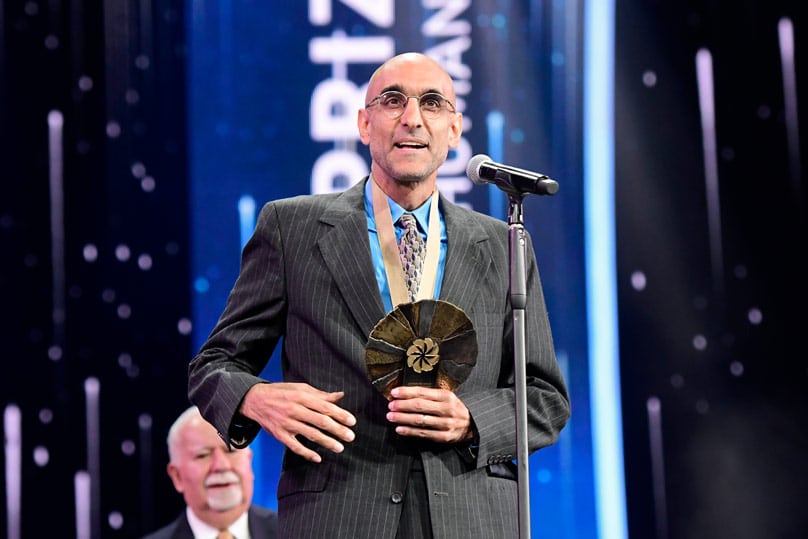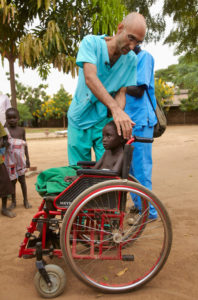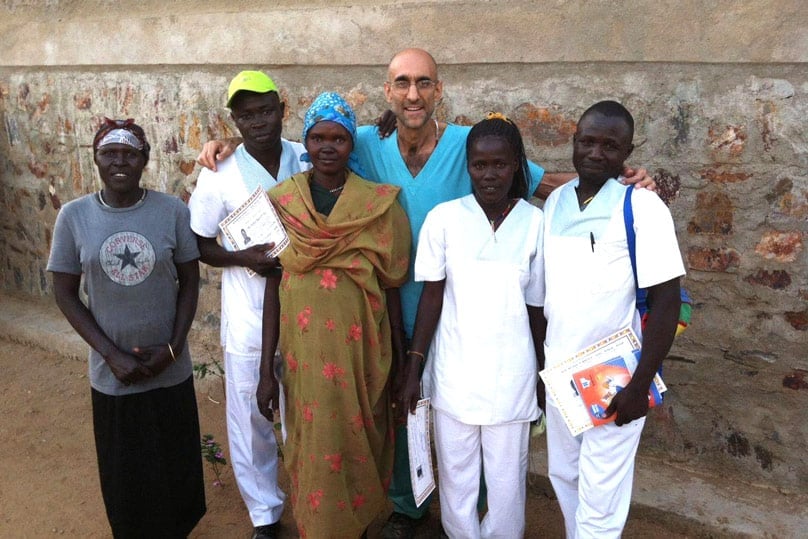
CNS/courtesy CMMB/Jaco Klamer/ Victor Boyko, Aurora Prize
A major international prize recognising outstanding humanitarian work has been awarded to an American Catholic doctor for his selfless work over a decade in the war-torn Nuba mountains of South Sudan.
The Aurora Prize awards a staggering $US1.1 million (approximately A$1,450,000) to a person who displays selfless courage and hope in the service of humanitarianism.
For the last nine years, Dr Tom Catena, an American Catholic missionary doctor has served as the only doctor in the 435-bed Mother of Mercy Hospital in the war-torn Nuba Mountains in South Sudan.

CNS/courtesy CMMB/Jaco Klamer/ Victor Boyko, Aurora Prize
“He was voted unanimously,” former Australian Foreign Affairs Minister Gareth Evans, who served on the selection panel, told The Catholic Weekly.
“He is an extremely attractive man, deeply modest, very engaging personally … he is doing a brilliant job for the Church, as well as for the people that he has been serving.”
A raft of internationally known figures including Hollywood A-lister George Clooney, Liberian Nobel Laureate, peace and women’s rights activist Leymah Gbowee, former Irish President Mary Robinson together with Nobel laureates Oscar Arias and Shirin Abadi were among the high-calibre judges for the Prize.
The Prize is brand new; Dr Catena’s award is only the second following its establishment in 2016. It was established on behalf and in memory of the survivors of the Armenian Genocide and in gratitude to their saviours. It seeks to empower individuals to offer life and hope to those in urgent need of basic humanitarian aid and thus continue the cycle of giving internationally.
The prize was established by Armenian philanthropists Vartan Gregorian, Noubar Afeyan and Ruben Vardanyan.
Dr Catena will receive $US100,000 for his own purposes and will donate $US1 million to three charities of his choosing. He graciously took time from his busy schedule to talk with The Catholic Weekly.
Tell me about your work?
I serve with the Catholic Medical Mission Board. For the last nine years, I have worked as the only doctor in the 435-bed Mother of Mercy Hospital. I now have another doctor with me, a paediatrician, who has been here for the past year. We also have three clinical officers, and a team of 40-50 nurses, most of which are trained on the job. The hospital also has lab personnel and pharmacy personnel who are all trained on the job.
What is your vocation state?
I married a local Sudanese woman last year, and we celebrated our first anniversary in May.

What inspired you to become a missionary?
I always wanted to do mission work and think it was my first vocation. I had the examples of centuries of great missionary saints whom I wanted to emulate. I chose to go into Medicine as it seemed a good fit for a life in the missions.
What made you stay in Nuba?
The decision to stay in Nuba was an easy one. When you are here and see there is so much need, and so few health professionals, then one feels compelled to stay on and contribute. I felt, as a missionary, that we are most needed by the people during times of crisis, when others have left. What kind of missionary witness would we give if we abandoned the people here when the fighting started and things became dangerous?
Was it hard to leave America for the first mission trip?
In some respects. It would be for anyone. However, I knew that I was making the right decision. I had received my calling – my duty – and I was eager to contribute any help I could provide to an area and people that I knew needed it the most.
Did you have any idea you would be staying for nine years?
Not at first. But after meeting these people, I was inspired to stay and continue to help. That, and of course after meeting my now wife, I knew I would be staying for some time.
Is there a particular prayer/devotion that gets you through the hard times?
I like to say the Rosary with my wife every morning on the way to Mass. This is how we start our day and prepare ourselves for the many challenges before us. I also feel called to service here and believe that our good Lord gives me the strength to carry on with the work.
What is the hardest thing about your work?
The most difficult part is having to watch your patients die. When three or four people die every day, when a woman comes in with a shattered leg because she stepped on a landmine, when you watch a child die of third degree burns from an incendiary bomb, and when you have to explain it to the family, you sometimes question your resolve. At that point, all this sadness and grief are sitting on top of your head. But then an old man asks you to stay, somebody you didn’t think would do well survives, a child comes up to you asking to play, and you get your sense back. You realise that we are perfectionists. We always think that there’s more to be done.
To see the pain and suffering on the faces of so many, so often, and knowing that regardless of how many people we treat each day, or how many surgeries we perform each year, the job will never be done, at least not until there is substantive action taken by the government of Sudan to address this issue.
This is another difficulty – the knowledge that the issue will not be addressed until the international community starts caring more about the atrocities occurring here. There needs to be more awareness, more action, and more steps taken to correct it. The last thing international governments should be doing is considering cuts to foreign aid.
As the only surgeon in Nuba, I can tell you that without a doubt, aid saves lives.
Were you surprised at winning the Aurora Prize?
Of course, there were so many other compelling stories and finalists in addition to mine. I’m just grateful for the opportunity to shine a larger spotlight on the current situation in Sudan, and to help deliver much needed resources to causes in need.
How can Australians help?
There are several ways. One of course is financial. Financial contributions are extremely helpful and extremely appreciated by us and other organisations working in these environments. The second is the inclination to get politically involved – to make yourself aware of the situation here, to write to their representative in government and try to lobby on behalf of the marginalised people of the world – speak on their behalf. Dictators can’t do dirty tricks in a vacuum, they need support from the international community – so if countries, like Australia, shut them off, play hardball with these dictators, a lot can change.
As well as a humanitarian award, the Aurora Prize also hopes to bring awareness and recognition of the Armenian Genocide at the hands of the Turkish (Ottoman) Empire (1914-1923). For more information visit www.auroraprize.com.
